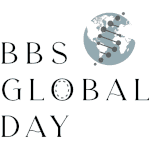BBS Global Day Date in the current year: September 23, 2026
 BBS Global Day is an annual awareness day observed on September 23. It was created to educate the public about Bardet-Biedl syndrome, a rare genetic disorder that affects multiple organ systems in the body.
BBS Global Day is an annual awareness day observed on September 23. It was created to educate the public about Bardet-Biedl syndrome, a rare genetic disorder that affects multiple organ systems in the body.Bardet-Biedl syndrome (BBS) is a rare genetic disorder that belongs to a diverse group of disorders collectively known as ciliopathies. Cilia are tiny, hair-like projections on the surface of many cells that play an important role in cellular communication and have other biological functions. For instance, cilia in the respiratory tract remove inhaled particles before they reach the lungs. In people with ciliopathies, cilia do not function properly, which can adversely affect many different organs since cilia are present on most types of cells.
BBS is caused by a mutation in one of more than 20 identified genes that produce proteins involved in ciliogenesis, or the development of cilia. The syndrome was named after the French physician Georges Bardet and the Hungarian physician Arthur Biedl, who independently described the first cases in 1920 and 1922, respectively. BBS is a rare disease affecting approximately 1 in 250,000 people globally.
BBS has six primary characteristics. According to diagnostic criteria, a person should be diagnosed with BBS if they exhibit four of the primary characteristics or three of the primary characteristics and at least two of the secondary characteristics. A diagnosis can be confirmed by genetic testing, if available.
The primary characteristics of BBS include:
- Retinal abnormalities resulting in visual impairment
- Obesity, which typically becomes apparent within the first year of life
- Extra fingers or toes (polydactily)
- Hypogonadism (diminished activity of the testicles or ovaries resulting in low sex hormone levels)
- Renal dysfunction
- Learning disabilities
Secondary features associated with BBS include developmental delays, speech disorders, behavioral and neurological problems, dental anomalies, high blood pressure, anosmia (loss of smell), thyroid issues, strabismus, short stature, toe and finger abnormalities other than polydactily, and flat, wide feet.
Symptoms and their severity can vary greatly between patients. For instance, some patients have significant cognitive impairment and learning disabilities, while others have normal intellect. Some patients experience significant vision impairment by their mid-teens, while others maintain sufficient vision to drive into their 30s.
Like many genetic conditions, BBS has no cure, though research into stem cell therapy, gene therapy, and suppressor therapy is ongoing. Treatment focuses on managing symptoms and may include physical therapy, speech therapy, occupational therapy, vision services, a carefully controlled diet and exercise to manage obesity, and more.
BBS Global Day is observed annually on September 23. It is coordinated by BBS International (Bardet-Biedl Syndrome Foundation) and supported by BBS family organizations in France, Italy, the Netherlands, the United Kingdom, and North America. The day aims to raise awareness of BBS, support affected families, and accelerate research into the condition.
- Category
- International Observances
- Tags
- BBS Global Day, Bardet-Biedl syndrome, international observances, rare diseases, genetic disorders, awareness days